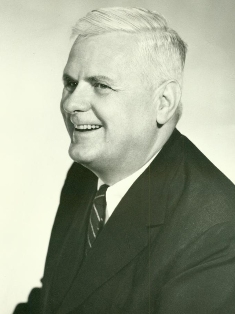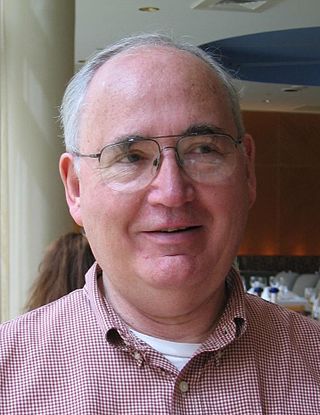Related Research Articles

Alonzo Church was an American mathematician, computer scientist, logician, and philosopher who made major contributions to mathematical logic and the foundations of theoretical computer science. He is best known for the lambda calculus, the Church–Turing thesis, proving the unsolvability of the Entscheidungsproblem, the Frege–Church ontology, and the Church–Rosser theorem. He also worked on philosophy of language. Alongside his doctoral student Alan Turing, Church is considered one of the founders of computer science.

Dana Stewart Scott is an American logician who is the emeritus Hillman University Professor of Computer Science, Philosophy, and Mathematical Logic at Carnegie Mellon University; he is now retired and lives in Berkeley, California. His work on automata theory earned him the Turing Award in 1976, while his collaborative work with Christopher Strachey in the 1970s laid the foundations of modern approaches to the semantics of programming languages. He has worked also on modal logic, topology, and category theory.
In mathematics and logic, a higher-order logic is a form of predicate logic that is distinguished from first-order logic by additional quantifiers and, sometimes, stronger semantics. Higher-order logics with their standard semantics are more expressive, but their model-theoretic properties are less well-behaved than those of first-order logic.

Samson Abramsky is Professor of Computer Science at University College London. He was previously the Christopher Strachey Professor of Computing at the University of Oxford, from 2000 to 2021. He has made contributions to the areas of domain theory, the lazy lambda calculus, strictness analysis, concurrency theory, interaction categories, geometry of interaction, game semantics and quantum computing. More recently, he has been applying methods from categorical semantics to finite model theory, with applications to descriptive complexity.

In computer science, concurrency is the ability of different parts or units of a program, algorithm, or problem to be executed out-of-order or in partial order, without affecting the outcome. This allows for parallel execution of the concurrent units, which can significantly improve overall speed of the execution in multi-processor and multi-core systems. In more technical terms, concurrency refers to the decomposability of a program, algorithm, or problem into order-independent or partially-ordered components or units of computation.

Logic in computer science covers the overlap between the field of logic and that of computer science. The topic can essentially be divided into three main areas:
The Kurt Gödel Society was founded in Vienna, Austria in 1987. It is an international organization aimed at promoting research primarily on logic, philosophy and the history of mathematics, with special attention to connections with Kurt Gödel, in whose honour it was named.
John Charles Reynolds was an American computer scientist.

The Donald E. Knuth Prize is a prize for outstanding contributions to the foundations of computer science, named after the American computer scientist Donald E. Knuth.
The ACM–IEEE Symposium on Logic in Computer Science (LICS) is an annual academic conference on the theory and practice of computer science in relation to mathematical logic. Extended versions of selected papers of each year's conference appear in renowned international journals such as Logical Methods in Computer Science and ACM Transactions on Computational Logic.
John Vivian Tucker is a British computer scientist and expert on computability theory, also known as recursion theory. Computability theory is about what can and cannot be computed by people and machines. His work has focused on generalising the classical theory to deal with all forms of discrete/digital and continuous/analogue data; and on using the generalisations as formal methods for system design; based on abstract data types and on the interface between algorithms and physical equipment.
Computational logic is the use of logic to perform or reason about computation. It bears a similar relationship to computer science and engineering as mathematical logic bears to mathematics and as philosophical logic bears to philosophy. It is synonymous with "logic in computer science".

Moshe Ya'akov Vardi is an Israeli mathematician and computer scientist. He is a Professor of Computer Science at Rice University, United States. He is University Professor, the Karen Ostrum George Professor in Computational Engineering, Distinguished Service Professor, and director of the Ken Kennedy Institute for Information Technology. His interests focus on applications of logic to computer science, including database theory, finite model theory, knowledge in multi-agent systems, computer-aided verification and reasoning, and teaching logic across the curriculum. He is an expert in model checking, constraint satisfaction and database theory, common knowledge (logic), and theoretical computer science.

Rajeev Alur is an American professor of computer science at the University of Pennsylvania who has made contributions to formal methods, programming languages, and automata theory, including notably the introduction of timed automata and nested words.

Ronald Fagin is an American mathematician and computer scientist, and IBM Fellow at the IBM Almaden Research Center. He is known for his work in database theory, finite model theory, and reasoning about knowledge.
Dexter Campbell Kozen is an American theoretical computer scientist. He is Joseph Newton Pew, Jr. Professor in Engineering at Cornell University. He received his B.A. from Dartmouth College in 1974 and his PhD in computer science in 1977 from Cornell University, where he was advised by Juris Hartmanis. He advised numerous Ph.D. students.

Prakash Panangaden is an American/Canadian computer scientist noted for his research in programming language theory, concurrency theory, Markov processes and duality theory. Earlier he worked on quantum field theory in curved space-time and radiation from black holes. He is the founding Chair of the ACM Special Interest Group on Logic and Computation.
David Lansing Dill is a computer scientist and academic noted for contributions to formal verification, electronic voting security, and computational systems biology.
Phokion G. KolaitisACM is a computer scientist who is currently a Distinguished Research Professor at UC Santa Cruz and a Principal Research Staff Member at the IBM Almaden Research Center. His research interests include principles of database systems, logic in computer science, and computational complexity.
Dale Miller is an American computer scientist and author. He is a Director of Research at Inria Saclay and one of the designers of the λProlog programming language and the Abella theorem prover.
References
- 1 2 Panangaden, Prakash (July 2014), "Welcome to SIGLOG!", Chair's Letter, SIGLOG News, 1 (1): 2–3.
- ↑ "SIGLOG Monthly Bulletin", SIGLOG Monthly Bulletin, 168, March 1, 2015.
- ↑ Official website , accessed 2015-08-13.
- ↑ Siekmann, Jörg M. (2014), "Computational logic", in Gabbay, Dov M.; Siekmann, Jörg M.; Woods, John (eds.), Handbook of the History of Logic, vol. 9: Computational Logic, North-Holland/Elsevier, pp. 15–30. See in particular p. 29.
- ↑ "NOTICES". The Bulletin of Symbolic Logic. 23 (4): 540–545. 2017. ISSN 1079-8986.
- ↑ "Alonzo Church Award". European Association for Theoretical Computer Science. Retrieved 2022-04-23.
- ↑ "Previous Awards – EACSL" . Retrieved 2021-11-13.